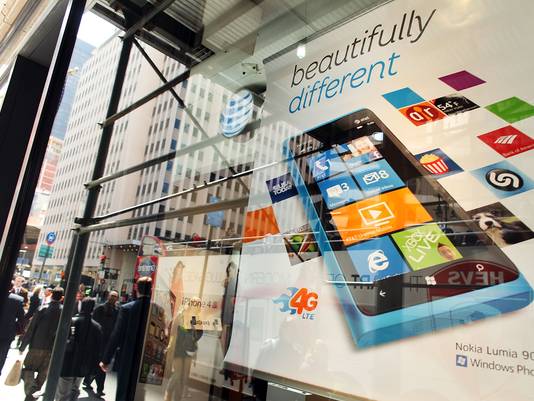Nokia returns to profit, but sales drop
HELSINKI (AP) -- Struggling Nokia turned a net profit of $270 million in the fourth quarter, compared with a loss of $1 billion a year earlier, but revenue fell 20% as it failed to make gains in the fiercely competitive smartphone market.
The Finnish company said Thursday that revenue dropped to $10.6 billion from as smartphone sales plunged 55%, and it gave a grim outlook, saying it would not pay a dividend for 2012 to save money.
The company's shares plunged more than 4% in Helsinki.
Nokia expects operating margins in the first quarter to be "approximately negative 2%, plus or minus four percentage points," citing increased competition and lower-than-expected demand for its flagship Lumia phones and cheaper Asha models, which have been popular in emerging markets.
Nokia said it sold 15.9 million smartphones in the quarter, down from 19.6 million a year earlier, including 4.4 million Lumia phones. In comparison, rival Apple sold almost 48 million iPhones.
Neil Mawston, a technology expert from Strategy Analytics in Boston, said Nokia's share of the global smartphone market had fallen to a record low of about 3 percent.
"Nokia is on a recovery curve at the moment," Mawston said. "In terms of volumes, they really need to improve. They regained profit, the next step is to regain market share."
The company sold only 4.6 million handsets in China, a fall of 69 percent from the previous year, with sales revenue there plunging 79% from the previous quarter.
"That's a whopping decline in the world's biggest phone market and smartphone market. China really was the one that jumped out the most in the report," Mawston said. "North American recovery was also less than expected."
Nokia, formerly the world's top cellphone maker, had hoped to stem the decline in smartphones through a partnership with Microsoft Corp. but North America - the frontline of the smartphone market - continued to be a disappointment. Shipments there grew 40 percent on the year, but to a mere 700,000 million devices.
In all, Nokia sold 45 million cellphones in the fourth quarter, 15 percent less than in 2011.
CEO Stephen Elop said he was encouraged that the company had reached "underlying profitability" and strengthened its financial position but cautioned that more cutbacks could be expected.
"We remain focused on moving through our transition, which includes continuing to improve our product competitiveness, accelerate the way we operate and manage our costs effectively," Elop said.
The company said it is not proposing any dividend for 2012 while in 2011 it paid a dividend of 0.20 Euro per share.
Not only has Nokia lost out in the fierce top-end race, it is now also losing ground to Asian makers in the market for cheaper devices and phones using Google's popular Android platform.
Nokia had led the cellphone market for 14 years, with its global market share peaking at 40 percent in 2008, but Samsung overtook it as the world's No. 1 cellphone maker a year ago.
Nokia Siemens Networks - a joint-venture with Germany's Siemens AG that has been loss-making for years - showed signs of improvement, mainly because of restructuring measures including substantial job cuts.
Elop said the division "drove record profitability" during the quarter, with operating profit surging to (EURO)251 million from (EURO)67 million the previous year as revenue grew 5 percent to (EURO)4 billion.
Nokia, which has been struggling to cut costs by (EURO)1.6 billion by the end of this year, announced 10,000 job cuts in June and closed down research and development facilities globally as well as its main manufacturing plant in Salo, Finland.
At the end of 2012, it employed a total of 98,000 people - down from 130,000 a year earlier.
Last month, it sold its head office near the Finnish capital -- a glass and steel structure that has been the company's main base since 1997 -- for $227 million and is leasing it back to save costs.
Copyright 2012 The Associated Press. All rights reserved. This material may not be published, broadcast, rewritten or redistributed.










